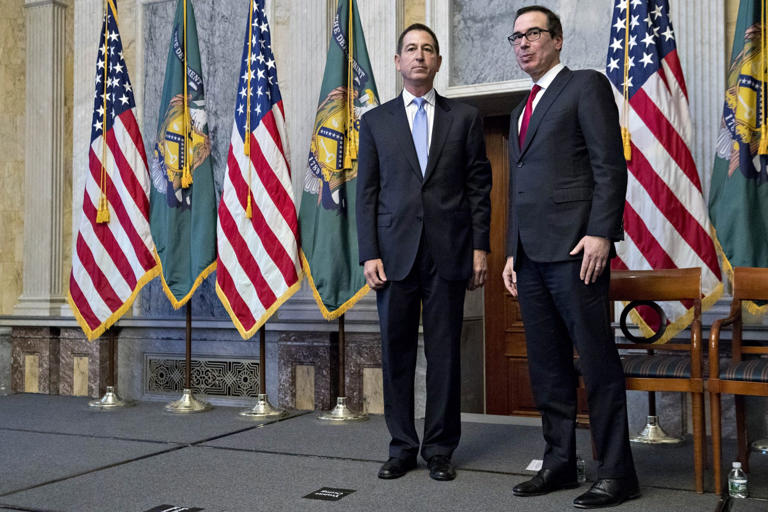An investor consortium led by Liberty Strategic Capital has announced a significant investment of over $1 billion in New York Community Bank (NYCB), a troubled financial institution where former Treasury Secretary Steve Mnuchin is poised to return alongside Joseph Otting.
Under the terms of the deal, Liberty Strategic will inject $450 million, with additional investments from Hudson Bay Capital Management ($250 million), and Reverence Capital Partners ($200 million). Citadel Global Equities, led by Ken Griffin, is also part of the consortium. The transaction is slated to close on March 11, with the investor group acquiring approximately 40% ownership in NYCB, according to a source familiar with the matter.
As part of the restructuring, NYCB plans to streamline its board to nine members and appoint four new directors, including Mnuchin, Otting, Milton Berlinski from Reverence Capital, and Allen Puwalski from Hudson Bay. Both Mnuchin and Otting have previous experience at OneWest Bank.
Otting, a former comptroller of the currency, will take the reins as NYCB’s third CEO in a short span, succeeding Sandro DiNello, who served for just a week and will resume his role as executive chairman. Otting is scheduled to assume his new position on April 1.
During an investor call, Otting expressed his intention to immediately delve into NYCB’s operations and collaborate with DiNello to build on the progress made during the interim period.
NYCB is among the largest regional banks in the U.S., boasting $116.3 billion in assets as of December 31. The bank has expanded through strategic acquisitions, including the purchase of Flagstar in December 2022, propelling it into the ranks of the top 25 regional banks. Additionally, NYCB acquired assets and liabilities from Signature Bank, one of three major banks that failed in 2023, alongside First Republic and Silicon Valley Bank, which were acquired by JPMorgan Chase and First Citizens Bank, respectively.
The $1 billion investment marks a pivotal moment for NYCB following a tumultuous period. The bank’s fourth-quarter earnings report on January 31 revealed a loss of 36 cents per share, falling short of Wall Street’s expectations. Additionally, NYCB significantly reduced its dividend by 71% to 5 cents per share. Consequently, Fitch downgraded the bank’s debt to BBB- on February 2, while Moody’s Investors Service downgraded NYCB’s debt to junk status on February 6.
Further challenges emerged on February 29 when NYCB disclosed “material weaknesses” in its internal controls related to a loan review process. As a result, the bank revised its fourth-quarter loss to $2.7 billion, attributing $2.4 billion of it to a goodwill charge associated with historical transactions predating 2007, as reported in an SEC filing. Thomas Cangemi resigned as president and CEO after 27 years with the company, with DiNello appointed to succeed him in both roles.
The downward trajectory continued on March 1 when Fitch further downgraded NYCB’s credit rating to junk status. Despite the positive news of the investment and leadership changes, NYCB’s shares have plummeted by over 60% this year. While the announcement of the investment initially boosted the stock by nearly 6% on Thursday, gains were short-lived, and by Friday afternoon, shares had fallen approximately 8% to $3.33.
Peter Winter, a senior research analyst at D.A. Davidson, noted the significance of the cash infusion and management changes but expressed caution about their immediate impact. He maintained a neutral rating on NYCB with a $4 price target, highlighting concerns about potential deposit outflows and the departure of private bankers from Signature Bank.
Getting the band back together
The $1 billion capital injection represents a reunion of key figures with extensive backgrounds in finance and banking.
Steve Mnuchin, former Treasury Secretary, had a notable career at Goldman Sachs spanning 17 years, where he held various roles in fixed income, currencies, commodities, and mortgage divisions. In 2009, Mnuchin led an investor group that acquired IndyMac, subsequently rebranded as OneWest Bank. His tenure at OneWest was marked by both successes and controversies, including criticism for foreclosure practices. Following the acquisition of OneWest by CIT Group in 2015, Mnuchin ventured into private equity, founding Liberty Strategic, focused on investments in technology, financial services, and content.
Joseph Otting, previously president and CEO of OneWest Bank, transitioned to CIT Bank following its acquisition. Subsequently, he served as comptroller of the currency before departing in 2020.
Milton Berlinski, a former Goldman Sachs executive, co-founded Reverence Capital in 2013 after a lengthy tenure at the investment bank. Reverence Capital specializes in middle-market financial services investments, with notable portfolio companies like EverBank.
While Mnuchin and Berlinski crossed paths during their time at Goldman Sachs, the investment in New York Community Bancorp marks their first collaboration. Although Berlinski hasn’t worked directly with Otting before, he holds him in high regard for his extensive experience in the banking sector.
Closing time
The $1 billion transaction gained momentum towards the middle and end of last week when New York Community Bancorp (NYCB) signaled its readiness to proceed. Following NYCB’s indication, Steve Mnuchin’s team reached out to Reverence Capital, which had been evaluating some of NYCB’s loan portfolios.
Reverence Capital brought significant knowledge of NYCB and its loan portfolio to the table, providing a solid foundation for the deal. Milton Berlinski emphasized that Reverence wasn’t starting from scratch in its assessment of the opportunity.
Bank acquisitions typically favor other banks as buyers, preferred by regulators like the FDIC. Private equity (PE) firms and hedge funds face limitations on acquiring voting equity exceeding 24.9% without transitioning into bank holding companies. However, none of the investors involved in the NYCB deal will approach this threshold.
Berlinski highlighted that the NYCB transaction presents Reverence with a rare chance to invest in a robust, nationally recognized franchise ranked among the top 20 banks. Opportunities of this caliber are not commonplace in the market, making this investment particularly appealing to Reverence Capital.
